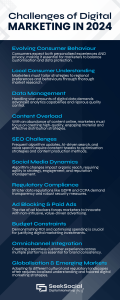21 June 2024
What Are The Challenges of Digital Marketing in 2024?
Digital marketing has become an integral part of business strategy, evolving rapidly with technological advancements and changing consumer behaviors. In 2024, marketers face several challenges, and require adaptive strategies to stay ahead and remain successful. This article explores the key challenges of digital marketing in 2024 and provides insights on how to navigate them effectively.
Evolving Consumer Behavior
One of the primary challenges of digital marketing in 2024 is adapting to evolving consumer behavior. Consumers today demand personalized experiences, which necessitates a deep understanding of their preferences and behaviors. However, this demand for personalization comes with heightened concerns over privacy and data protection. Marketers must find a balance between providing tailored experiences, and respecting consumer privacy to build trust and loyalty.
Understanding Local Consumer Behavior
Another of the key challenges of digital marketing in 2024 is understanding and adapting to local consumer behavior in diverse regions. Consumer preferences, purchasing habits, and communication preferences vary significantly across different markets. Marketers must conduct comprehensive market research to gain insights into the unique characteristics of each region’s target audience.
AI and Machine Learning Integration
In the context of the challenges of digital marketing in 2024 that they encountered, Artificial Intelligence (AI) and machine learning are transforming digital marketing. The rapid pace of technological advancements are amongst both the opportunities and challenges, since the integration of artificial intelligence (AI) and machine learning into marketing strategies is more prevalent than ever. These technologies offer sophisticated data analysis and automation capabilities, but their effective implementation requires significant investment and expertise. Marketers must stay updated with the latest MarTech tools and find the right balance between automation and the human touch to maintain meaningful engagement with their audience.
Data Management and Analytics
In the challenges of digital marketing in 2024, data overload emerges as a significant obstacle for marketers. With the exponential growth of digital interactions, the sheer volume of data generated daily poses challenges in terms of ensuring accuracy, integrity, and extracting actionable insights to drive informed decision-making.
Data overload is a significant challenge in digital marketing. With the vast amount of data generated daily, ensuring data accuracy and integrity is crucial. Marketers need to leverage advanced analytics tools to extract actionable insights from this data, which can inform their strategies and improve decision-making. Effective data management practices, including regular audits and quality checks, are essential to maintain the reliability of data.
Content Overload and Content Strategy
In an era of content overload, standing out in the crowded digital space is increasingly difficult. Because of this the challenges of digital marketing in 2024 can include crafting engaging and unique content that captures the audience’s attention. Marketers must focus on quality over quantity, developing a content strategy that aligns with their brand values and resonates with their target audience. Effective content distribution strategies, including leveraging multiple platforms and formats, are also crucial for maximizing reach and engagement – so investing in training and cutting-edge tools, and staying informed about technological advancements are essential steps to overcome the challenges of digital marketing.
SEO and Search Algorithm Updates
In the modern day SEO remains a cornerstone of good digital marketing, but keeping up with frequent search algorithm updates is challenging, as it always has been. However, add in the rise of voice search and AI-driven search results, and it’s not hard to see how SEO is still one of the main challenges of digital marketing in 2024. Marketers need to optimize their content for these new search paradigms, focusing on natural language processing and long-tail keywords. Maintaining organic reach amidst the growth of paid advertising also requires a strategic approach to content creation and distribution.
Social Media Dynamics
When talking about the challenges of digital marketing in 2024, we can’t overlook the ways in which social media platforms are constantly evolving, presenting both opportunities and challenges for digital marketers. Changes in social media algorithms can drastically affect the visibility of organic posts, requiring marketers to stay agile and adapt their strategies accordingly. Additionally, handling negative feedback and managing online reputation are ongoing challenges of digital marketing in 2024.
The dynamic nature of social media algorithms presents a significant challenge for digital marketers in 2024, as changes in these algorithms can have a direct impact on the visibility and reach of organic posts. Marketers must stay abreast of these algorithm updates and be prepared to pivot their strategies to ensure continued audience engagement and reach. The need for agility and adaptability in response to these algorithm changes is paramount, requiring marketers to constantly refine their approach to content creation and distribution on social media platforms to address the challenges of digital marketing in 2024.
Moreover, the management of online reputation and handling negative feedback has become a critical aspect of digital marketing in 2024. With the rise of social media as a primary channel for customer interactions and feedback, brands are more exposed than ever to public scrutiny and criticism. Digital marketers need to be adept at monitoring online conversations, addressing negative feedback promptly, and effectively managing brand reputation in the digital sphere. Building and maintaining a positive online reputation is essential for fostering trust and credibility with consumers, making reputation management a key focus for digital marketing strategies in the current landscape.
Social media platforms therefore present both new opportunities and new challenges for digital marketers. Navigating new features and policies requires adaptability and a keen understanding of platform dynamics. Staying updated with changes on major platforms like Facebook, Instagram, and TikTok is essential.Creating engaging, platform-specific content and building authentic relationships with influencers can enhance social media performance to overcome the challenges of digital marketing in 2024, but these strategies must be carefully managed to avoid potential pitfalls.
Regulatory and Compliance Issues
Navigating the complex landscape of regulatory and compliance issues is a major challenge for digital marketers. In 2024, regulations such as GDPR and CCPA continue to impact how companies collect and use consumer data. Ensuring compliance with these regulations requires a thorough understanding of the legal requirements and implementing robust data protection measures. Marketers must also manage cookie consent and provide transparent communication about data usage to maintain consumer trust.
Ad Blocking and Paid Advertising Challenges
The surge of ad blockers poses a notable obstacle for paid advertising efforts, compelling marketers to innovate and craft creative strategies to navigate this hurdle successfully – so of course it’s worth mentioning when we’re talking about the challenges of digital marketing in 2024. To address these challenges of digital marketing in 2024 effectively, the emphasis is on adopting non-intrusive ad formats and curating content that provides genuine value to the audience.In modern digital marketing, the challenges are many, and demanding.
The surge in usage of ad blockers poses a notable obstacle for paid advertising efforts, compelling marketers to innovate and craft creative strategies to navigate this hurdle successfully. To address these challenges of digital marketing in 2024 effectively, the emphasis should be on adopting non-intrusive ad formats and curating content that provides genuine value to the audience.
Budget Constraints
Balancing ROI and Investment in Digital Marketing
In the landscape of challenges of digital marketing in 2024, budget constraints loom large as marketers navigate the complexities of allocating resources effectively. With the proliferation of digital channels and the constant evolution of consumer behaviors, optimizing expenditure while achieving desirable outcomes becomes increasingly challenging.
Demonstrating ROI Amidst Scrutiny
Digital marketing budgets often face intense scrutiny from stakeholders, demanding clear evidence of return on investment (ROI). Marketers must meticulously track and analyze campaign performance, attributing conversions and revenue generation to specific marketing efforts. Demonstrating tangible results requires comprehensive analytics and reporting tools, enabling marketers to quantify the impact of their strategies in terms of revenue, leads generated, or brand engagement metrics.
Precision in Tracking and Analysis
Precise tracking of campaign performance is essential for justifying digital marketing expenditures. Marketers leverage a range of analytics platforms and metrics to monitor key performance indicators (KPIs) such as website traffic, conversion rates, click-through rates, and customer acquisition costs. By analyzing data trends and identifying patterns, marketers gain insights into the effectiveness of different strategies and channels, enabling informed decision-making regarding resource allocation.
Cost-Effectiveness and Strategy Optimization
In the face of budget constraints, marketers must identify and prioritize strategies that deliver the highest ROI. This entails conducting thorough cost-benefit analyses to evaluate the efficiency of various digital marketing tactics. Strategies that demonstrate optimal cost-effectiveness, such as targeted advertising, content optimization, and email marketing automation, are prioritized for continued investment. Additionally, ongoing optimization and refinement of campaigns based on performance insights help maximize ROI and mitigate budgetary constraints.
Balancing Innovation and Resource Management
Striking the right balance between investing in new technologies and managing costs is paramount for sustainable growth in digital marketing. While innovation drives competitiveness and differentiation, it also incurs additional expenses. Marketers must carefully evaluate emerging technologies and trends, assessing their potential impact on campaign performance and ROI. Investing in innovative solutions that offer tangible benefits, such as AI-powered analytics tools or immersive digital experiences, can yield long-term gains and competitive advantages.
Omnichannel Marketing Integration
The challenges of digital marketing in 2024 include the task of providing a seamless customer experience across multiple channels. Omnichannel marketing integration demands that online and offline endeavors and strategies work together to establish a unified brand experience. This process entails a deep understanding of customer journeys and the maintenance of consistency in messaging and interaction across all touchpoints. Tracking relevant metrics and Key Performance Indicators (KPIs) is essential in measuring the effectiveness of omnichannel campaigns, and of paramount importance here.
Emerging Markets and Globalization
Another of the challenges of digital marketing in 2024 is adapting digital marketing strategies to the different regions you might operate in. Understanding local consumer behavior and navigating various digital landscapes pose significant challenges. And marketers must tailor their campaigns to meet the specific needs and preferences of each area, considering cultural differences and local regulations. Successful globalization therefore requires a flexible and localized approach to digital marketing.
Conclusion
The challenges of digital marketing in 2024 are multifaceted and require marketers to be agile, informed, and innovative. From evolving consumer behavior and technological advancements to data management, content strategy, and regulatory compliance, each challenge presents an opportunity for growth and improvement. By staying updated with the latest trends, leveraging advanced tools, and adopting a customer-centric approach, marketers can navigate these challenges and drive successful digital marketing campaigns.
As the digital landscape continues to evolve, it’s crucial for marketers to remain proactive and adaptable. The future of digital marketing lies in understanding and addressing these challenges effectively, ensuring that brands can connect with their audience in meaningful ways and achieve their business goals.
By focusing on these key challenges and developing strategic solutions, digital marketers can stay ahead of the curve and thrive in the ever-changing digital environment of 2024.


